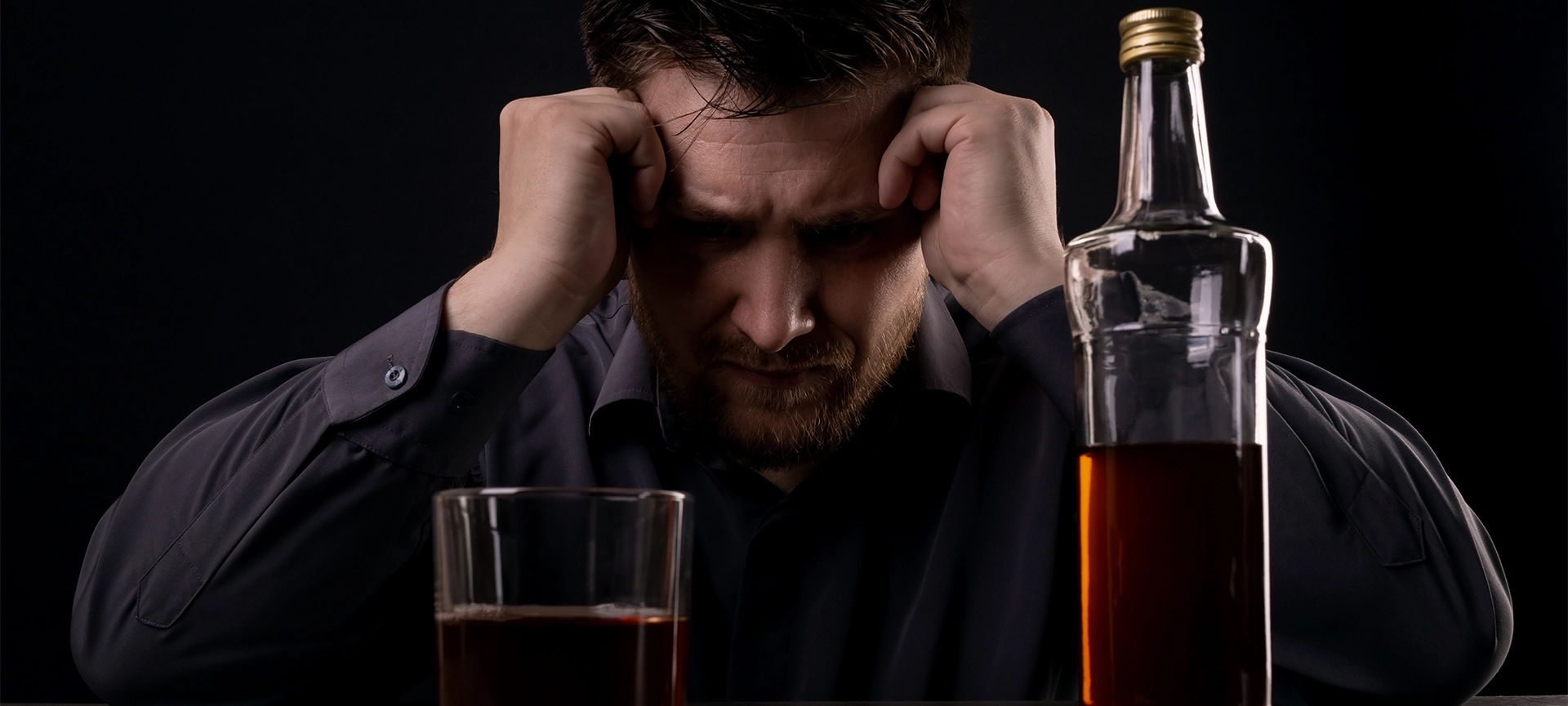Co-occurring mental health disorders, also known as dual diagnosis or comorbidity, refers to the coexistence of alcohol addiction and one or more mental health disorders.
Addressing co-occurring mental health disorders and alcohol addiction is a delicate endeavour. Any alcohol addiction treatment program must cater to the unique requirements of the mental health disorder while also helping you develop tools & a structure for alcohol abuse recovery.
It’s a lot. But with the assistance of professional alcohol treatment & mental health specialists, it’s doable.
Here, we’ll shed light on co-occurring mental health disorders and explore the signs and symptoms of alcohol addiction with co-occurring mental health issues. Perhaps most importantly, we’ll explore professional treatment methods to manage both conditions effectively.
Understanding the link between Alcohol Addiction and Co-occurring Mental Health Disorders
According to the Journal of the American Medical Association, up to 50% of individuals with mental health disorders abuse substances. This statistic indicates a direct link between substance abuse and mental health disorders.
Alcohol addiction and co-occurring mental health disorders, known as dual diagnosis, have a complex relationship. Individuals may turn to alcohol as a coping mechanism to self-medicate symptoms of mental health conditions, such as depression or anxiety.
Excessive alcohol consumption can worsen the symptoms of these mental health conditions, leading to a challenging cycle of dependence and emotional distress.
Alcohol addiction and mental health disorders can influence and interact with one another in the following ways:
Self-Medication
People with mental health disorders may turn to alcohol as a coping mechanism to alleviate their symptoms temporarily. For instance, individuals with depression might use alcohol to ease feelings of helplessness and irritability, while those with anxiety may seek relief from their worries.
Impact on Mental Health Symptoms
Excessive alcohol consumption does not cause mental health disorders, but it can worsen the symptoms of existing conditions. For instance, drinking alcohol may lead to increased anxiety or depression, intensifying the impact of co-occurring disorders.

Mutual Reinforcement
The symptoms of alcoholism and mental health disorders can exacerbate one another, leading to a downward spiral of emotional well-being and alcohol dependency. This mutual reinforcement requires comprehensive and integrated treatment approaches.
Related Article: Finding the Right Alcohol Addiction Rehab Center: Factors to Consider
Common Mental Health Disorders that Co-Occur with Alcohol Addiction
The following mental health disorders often co-occur with alcohol addiction:
Depression
Depression is a mood disorder characterized by persistent sadness, loss of interest, and a lack of energy. Individuals with depression may turn to alcohol to self-medicate their emotional pain, leading to a dangerous cycle of alcohol use and worsening depressive symptoms.
Anxiety Disorders
Anxiety disorders include generalized anxiety disorder (GAD), social anxiety disorder, and panic disorder. People experiencing high levels of anxiety may resort to alcohol consumption as a coping mechanism to alleviate feelings of fear and stress temporarily.
Bipolar Disorder
Bipolar disorder involves extreme mood swings, including periods of mania and depression. During manic episodes, individuals may engage in impulsive behaviours such as excessive alcohol consumption, while during depressive phases, alcohol may be used to alleviate feelings of sadness.
Schizophrenia
Schizophrenia is a severe mental disorder characterized by delusions, hallucinations, and disorganized thinking. Alcohol abuse is common in individuals with schizophrenia and may further complicate their condition and treatment.
Personality Disorders
Individuals with these disorders may struggle to regulate emotions and misuse alcohol to cope with emotional instability.
Post-Traumatic Stress Disorder (PTSD)
PTSD occurs after experiencing or witnessing a traumatic event. Alcohol use can be a way for individuals with PTSD to numb emotional distress related to traumatic memories.

Identifying Signs and Symptoms of Co-occurring Mental Health Disorders in Alcohol Addiction
It often requires professional intervention to confirm the existence of a mental health disorder alongside an alcohol abuse problem. The signs & symptoms will vary depending on the mental health issue and frequency of alcohol intake.
Here are a few signs it’s time to discuss possible co-occurring mental health disorders with an alcohol addiction specialist.
- Changes in Mood: You might experience extreme mood swings, prolonged periods of sadness, or unexplained anger.
- Anxiety and Panic: Feelings of excessive worry, fear, or panic attacks may be present.
- Social Withdrawal: You may isolate yourself from friends and family or lose interest in activities you once enjoyed.
- Sleep Disturbances: Alcohol addiction can disrupt sleep patterns, leading to insomnia or irregular sleep.
- Impaired Concentration: Difficulty focusing, memory lapses, and reduced attention span might become evident.
- Physical Health Issues: Co-occurring disorders can manifest in physical symptoms like headaches or digestive problems.
Integrated Treatment Methods for Co-occurring Mental Health Disorders & Alcohol Addiction
Thanks to recent advances in addiction treatment techniques, you can address co-occurring mental health disorders and alcohol addiction through integrated treatment.
Integrated addiction treatment aims to provide comprehensive and coordinated care to individuals dealing with both conditions, recognizing that each condition can influence the other and impact your overall well-being and functioning.
The primary objectives of integrated treatment include:
- Holistic Assessment: Integrated treatment involves thoroughly assessing your mental health, substance use history, and any co-occurring disorders. This assessment helps healthcare professionals identify each condition’s unique symptoms and interactions, leading to a tailored treatment plan.
- Addressing Root Causes: The approach acknowledges that co-occurring disorders often have common root causes, such as traumatic experiences or genetic predispositions. Treatment can be more effective and sustainable by identifying and addressing these underlying factors. For instance, a person with a history of childhood trauma may use alcohol to cope with anxiety and emotional pain. Integrated treatment would focus on trauma-informed therapy alongside addiction treatment.
- Collaborative Care: Integrated Treatment involves collaboration among various healthcare providers, including psychiatrists, psychologists, addiction specialists, and counsellors. This interdisciplinary approach addresses all aspects of your well-being and recovery.
- Evidence-Based Interventions: Integrated treatment combines evidence-based interventions from both mental health and addiction fields. This may include cognitive-behavioural therapy (CBT), dialectical behaviour therapy (DBT), motivational interviewing, and medication management. For context, a person with co-occurring anxiety disorder and alcohol addiction might receive CBT to address anxiety symptoms and coping mechanisms to reduce alcohol use.
- Continuum of Care: Integrated treatment emphasizes continuity of care, ensuring you receive ongoing support throughout your recovery journey. It may include outpatient therapy, support groups, and relapse prevention strategies.
- Education and Support for Families: Integrated treatment involves educating and involving the family members of individuals with co-occurring disorders. Family support can be crucial in the recovery process.
Integrated Treatment recognizes that successful recovery from co-occurring disorders requires a comprehensive approach considering the interplay between mental health and addiction. By addressing both conditions concurrently, you can achieve lasting recovery and improved overall well-being.
Other professional treatment options for addressing co-occurring mental health disorders include:
- Medical Detoxification: If necessary, start with medically supervised detox to safely manage withdrawal symptoms from alcohol.
- Psychotherapy: Engage in individual and group therapy sessions that target both addiction and mental health concerns. Cognitive-behavioural therapy (CBT) and dialectical behaviour therapy (DBT) can be particularly effective.
- Medication Management: Certain medications can aid in managing mental health symptoms and reduce cravings associated with alcohol addiction.
- Support Networks: Surround yourself with a supportive network of friends, family, and support groups to foster lasting recovery.
Related Article: Understanding the Connection Between Trauma and Addiction: A Path to Recovery

Final Thoughts
The complexities of co-occurring mental health disorders in alcohol addiction are manageable with an integrated treatment approach supervised by experienced addiction treatment specialists.
As you embark on your journey to recovery, our caring professionals at Addiction Rehab Toronto understand your struggles and are ready to help you on the path to healing.
You deserve to live a life free from alcohol addiction and mental health challenges. Take that step, seek help, and reclaim your life.
Call us at 1-855-787-2424 to discuss treatment programs.







